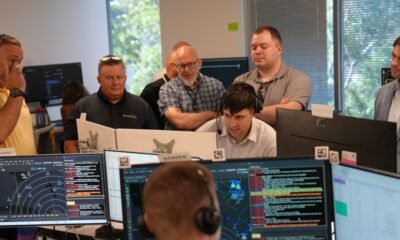Funding & Business
RealSense spins out of Intel to scale its stereoscopic imaging technology

After 14 years of developing inside of semiconductor giant Intel, RealSense is striking out on its own.
RealSense sells cameras that use stereoscopic imaging, a process that combines two images of the same object from different angles to create depth, enhanced with infrared light. This technology helps machines like robots, drones, and autonomous vehicles have a better perception of the physical world around them. The tech is also used for facial authentication.
“The common denominator of all of them is they live in the real, physical world,” CEO Nadav Orbach told TechCrunch. “They need to understand the surroundings in 3D and based on that, take and plan actions right in the world. And for that, they need a real-time, high-accuracy ability to understand the surrounding in 3D. And that’s what we do best.”
Orbach joined Intel back in 2006 as a CPU architect in Israel. He started working on vision technology in 2011 before becoming the general manager of incubation and disruptive innovation in 2022 and moving to San Francisco last year.
“We knew and understood that 3D perception was going to be big,” Orbach said about the early days of RealSense. “To be honest, we weren’t quite sure in which domain. We tried that across different market segments and different applications, all the way from gesture recognition with computers, phones, until we really found our sweet spot over the years, mostly in robotics.”
The company works with numerous industries outside of robotics, too. Orbach said they’ve heard from fish farms looking to track the volume inside their pens. Chipotle has also used RealSense cameras, in a partnership with AI restaurant software company PreciTaste, to track when food containers are low.
RealSense has more than 3,000 customers and has seen a surge in new interest over the last three to four years as AI has improved. With that, the applications for robotics, especially, have scaled.
The company realized it may have a better chance keeping up with demand — and scaling itself — if it spun out of Intel and raised its own capital, Orbach said.
The spinout plans hatched last year and got the approval from former Intel CEO Pat Gelsinger. The company is now independent and raised a $50 million Series A funding round from Intel Capital and other strategic investors to get started on its own.
“For me, it was exciting, to be honest,” Orbach said. “I’m a veteran executive in the company, but it’s first time that I’m, you know, I was on the other side of the table. It was a very humbling experience for me as a first-time CEO to go and and raise money.”
RealSense will put the capital toward building out its go-to-market team and making improvements to its technology. The company is particularly focused on improving the tech so it can help improve safety during humans and robot interactions and to improve access control.
“There is a learning curve of, you know, stepping out,” Orbach said. “I’m extremely excited about that. I’m fortunate to have a very strong team with a lot of people in my team that that have entrepreneurial experience. I feel that with my background, together with with some strong teammates, I think we have the right mix for success. And for me, it’s a dream coming true.”
Funding & Business
Russian Oil Majors Report Income Dip on Weak Price, Strong Ruble

Russian oil producers’ profits dived in the first half of the year, driven down by lower crude prices and a stronger ruble.
Rosneft PJSC, the state-controlled giant accounting for more than a third of Russia’s total oil production, reported 245 billion rubles ($3 billion) of net income in the first six months of the year, down by over 68% from the same period in 2024, the producer said in a statement on Saturday.
Funding & Business
Longest Rise in UK Home Listings Since 2004 Weighs on Prices

Home listings in the UK have been piling up for about a year — their longest streak in two decades — as cautious buyers and the rise in supply point to further downward pressure on prices, according to the latest Royal Institution of Chartered Surveyors survey.
Source link
Funding & Business
US Tariffs: Swiss Gold Industry Lobby Rejects Idea of US Relocation

Switzerland’s trade group for gold refiners opposes a relocation of some operations to the US to ease a trade imbalance between the countries and help tariff negotiations, newspaper Neue Zuercher Zeitung reported.
The government is trying to find ways to get President Donald Trump to lower his 39% tariff on Switzerland, which is damaging companies and the economy. There have been suggestions that moving gold refining capacity to the US would be an option to appease Trump.
-
Tools & Platforms3 weeks ago
Building Trust in Military AI Starts with Opening the Black Box – War on the Rocks
-

 Ethics & Policy1 month ago
Ethics & Policy1 month agoSDAIA Supports Saudi Arabia’s Leadership in Shaping Global AI Ethics, Policy, and Research – وكالة الأنباء السعودية
-

 Events & Conferences3 months ago
Events & Conferences3 months agoJourney to 1000 models: Scaling Instagram’s recommendation system
-

 Jobs & Careers2 months ago
Jobs & Careers2 months agoMumbai-based Perplexity Alternative Has 60k+ Users Without Funding
-

 Funding & Business2 months ago
Funding & Business2 months agoKayak and Expedia race to build AI travel agents that turn social posts into itineraries
-

 Education2 months ago
Education2 months agoVEX Robotics launches AI-powered classroom robotics system
-

 Podcasts & Talks2 months ago
Podcasts & Talks2 months agoHappy 4th of July! 🎆 Made with Veo 3 in Gemini
-

 Podcasts & Talks2 months ago
Podcasts & Talks2 months agoOpenAI 🤝 @teamganassi
-

 Jobs & Careers2 months ago
Jobs & Careers2 months agoAstrophel Aerospace Raises ₹6.84 Crore to Build Reusable Launch Vehicle
-

 Mergers & Acquisitions2 months ago
Mergers & Acquisitions2 months agoDonald Trump suggests US government review subsidies to Elon Musk’s companies





















